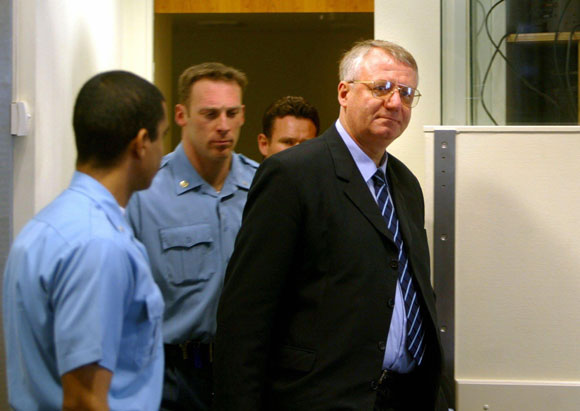
Vojislav Seselj enters the international court where he is charged for inciting war crimes during the Bosnian Wars in the 1990s. Photo by Toussaint Kluiters/AFP
What elements of propaganda speech are most effective in triggering genocide?
Past legal arguments have relied heavily on the role of dehumanization in propaganda, referring to people as insects, for example. But Christine Lillie, a Duke postdoctoral student in cognitive neuroscience, has found that dehumanization may not be the prime instigator to genocide in such speeches.
Instead, her research of speeches by a former Serb politician on trial at The Hague found that revenge-based propaganda incited a greater acceptance of violence from listeners.

Christine Lillie
Her findings interested prosecutors at the International Criminal Tribunal for the former Yugoslavia (ICTY) in the Netherlands. On July 7, Lillie will present her research at The Hague.
Specifically, she will share her findings related to propaganda speeches given by Vojislav Seselj, a nationalist Serbian politician who has been on trial since 2007 before a three-judge panel there.
At the ICTY, Seselj and fellow former Bosnian Serb politician Radovan Karadžić are accused of making war propaganda and inciting persecution of non-Serb groups in the region. The long-running trials hold Seselj culpable for violence against Croat, Muslim and other non-Serb populations in Serbia and parts of Croatia and Bosnia during the wars between 1992 and 1995. The goal of the violence, which researchers estimate claimed nearly 100,000 lives, nearly half of them civilian, was to create a Greater Serbian state free of non-Serb populations. The wars were marked by civilian massacres and mass rape of civilian women.
As a result of her research, Lillie said prosecutors may want to hold revenge-based propaganda more responsible for ensuing crimes.
"A lot of research has been done on propaganda but not a lot on genocide propaganda," she said, adding that her work seeks to bridge psychology and law.
The results surprised Lillie's co-researcher, Richard Wilson, a professor of law and anthropology at the University of Connecticut law school and founding director of the Human Rights Institute at UConn.
"The results are very important for the administration of international criminal law," he said. "The problem is at these international tribunals, the cases are heard by judges and they are working in a vacuum with regard to the social science of hate speech. They have a legal approach to speech but that is quite distinctive from the psychology of hate speech."
Lillie's research, which has not yet been published, coded 242 propaganda speeches given by Seselj for references to revenge, nationalism, stereotyping, dehumanization, justice, victimization, religion, past atrocities and direct threat. Duke undergraduate student Brock Knapp helped collect the data as part of his senior thesis.
Based on the coding, Lillie then constructed composite speeches using excerpts from the originals so that each speech focused on one of the above topics.
As part of the study, nearly 400 American adults read either one of the constructed speeches or a control speech, and were told to imagine that they are member of the Serb group (the in-group). They were then asked questions about empathy, perception of intent, and the moral justification of violence.
"We found that only the references to past atrocities and revenge impacted the participants’ willingness to morally justify violence," Lillie said. "However, all of the categories of speech impacted empathy. There was reduced empathy toward the non-Serb or 'out-group' and increased empathy for their own group."
Lillie also examined individual responses and found that those who believe the world is not a just place and those who are more conservative were more likely to endorse the moral justification of violence.
The information could help prosecutors at international tribunals better understand what types of speech incite listeners toward the most severe violence, which in turn would affect which cases prosecutors pursue, Wilson said.
Wilson said defense attorneys at The Hague may respond that the research is insignificant because it surveyed American responses in a different culture and time than Serbia during the war.
But that argument would make the case for more study of the psychological effects of hate speech, said Wilson, adding that the result could mean additional scientific evidence to help lawmakers and judges make more informed decisions.
Lillie, who works in the Moral Attitudes and Decision-Making (MADLAB) lab of psychology professor Phil Costanzo and ethics professor Walter Sinnott-Armstrong, said her findings have broader implications for the relationship between psychology and law.
"The law makes many claims about human behavior, but it may not be as obvious or predictable as presumed," she said.